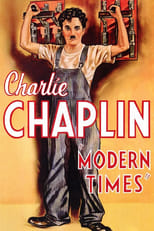← Back to Movies
Modern Times
Cast
Charlie Chaplin, Paulette Goddard, Henry Bergman, Tiny Sandford View AllCrew
Charlie Chaplin (Screenplay), Charlie Chaplin (Director) View All
Release: Feb. 5th, 1936
Runtime: 1 hour, 27 minutes
Replies Discussions
We didn't find any linked discussions for this film. Here are the results of a quick search of possibly related threads:
21
Does Modern Times (1936) count as a sci-fi movie?
It seems that every site says it's a comedy only, but it feels like a futuristic sci-fi movie when you watch it, mostly cause of the live video screen feed, in which Charlie Chaplin's character's boss...
2
Movie with scene at Colosseum in modern times
I believe the movie came out sometime in the last 15 years??
Male actor goes to Colosseum with female actor and they are closed for the day for tours. He finds a way in or breaks in and then let's ...
142
Why are modern movies still good but modern pop music not?
Personal opinion is that modern movies and TV are still of high quality (Breaking Bad for example), but that modern pop music has become very bland and commerical compared to how it was pre-90s.
An...
Post a Comment
Got something to say? Log in to comment, or register for free. It's quick, easy, and we won't spam you or anything.
Reviewed by
In one of the film's most infamous sequences, Chaplin's character is actually sucked into a large machine, just one step away from being a literal cog in the machine.
Modern Times (1936) Director: Charles Chaplin Writer: Charles Chaplin Cast: Charles Chaplin, Paulette Goddard, Henry Bergman Genre: Comedy, Dram.
The film initially seems to rely on speech when it comes to having the factory boss address workers or in having a recording that describes the feeding-machine to the factory boss, but it all but abandons that conceit as the film wears on and it starts relying on title cards like a regular silent fi....